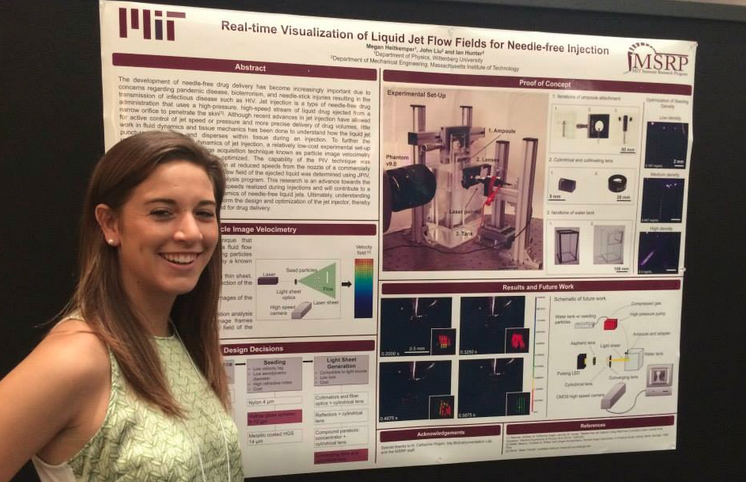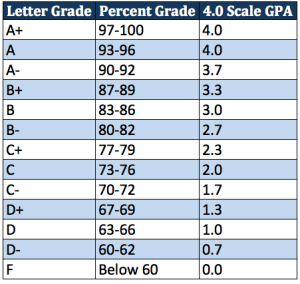On Take Your Success, I regularly interview top-performing college students to understand how they’re successful, so you can recreate the success in your life. Take what’s helpful, dismiss what’s not!
Megan Heitkemper, a senior at Wittenberg University, spent her summer in a research position at the Massachusetts Institute of Technology (MIT).
When I heard Megan got accepted to this prestigious position, I immediately set up plans for an interview. We are talking about MIT after all! Plus, there hasn’t been a science-related interview in three to four months, so the science people need their fix.
However, if your field has no connection to science, don’t believe the lie that you can’t learn from a different field of study. There are great takeaways at the end of the interview that will apply to you regardless of your major.
Now, it’s interview time.
——
Brian: What were your general responsibilities this summer?
Megan: In the BioInstrumentation Lab, I was responsible for completing a project on furthering the understanding of a jet injector for needle free drug delivery. This new process could eliminate needle stick injuries that cause the spread of HIV and other diseases. The injector works by penetrating the skin with a high pressure, high velocity stream of liquid.
I designed and built a setup to image the ejection of the liquid from the nozzle of the jet injector in order to give the lab more information about its flow field. Ultimately, understanding the behavior of the jet stream will drive the use of jet injectors as a viable alternative to needle and syringe drug delivery.
In addition to the work in lab, the program I was in (MIT summer research program) had intern deliverables throughout the summer. I had deadlines for a descriptive abstract, statement of purpose, final abstract, and poster presentation.
I also was responsible for presenting a faculty paper outside of my own field. The program had faculty presentations every Tuesday morning, and professional development sessions every Thursday evening.
Brian: I would imagine there were plenty of nerves in the beginning. Did anything in particular help you get more comfortable?
Megan: I went into this experience knowing it was going to be really tough, it was even stated in my acceptance letter that “the MIT experience is like trying to drink water from a fire hose.”
Fortunately, everyone in my program was also struggling with the nerves, stress, and imposter syndrome like me. So our program sessions spent a lot of time addressing these common issues.
One thought process that really helped me was remembering that I was selected for the program, meaning the admission committee thought that I was qualified and capable of accomplishing everything that was asked of me.
When recalling that I was apart of the 5% of accepted applicants, I gained confidence that made me feel more comfortable among the brightest minds in the STEM disciplines.
Brian: How often did you interact with MIT professors? And what did you learn from them?
Megan: The particular professor whose lab I worked in, Dr. Ian Hunter, was very hands off with his graduate students. Consequently, being an undergraduate research intern, I had very few chances to meet with him one on one. I presented my progress to the entire lab bimonthly, and he attended the conference poster session that was a summary of my work.
In this way, I learned a great deal about being independent. Through working with Dr. Hunter, I have become more in tune with what I want out of graduate school and the kind of relationship I would like to have with a faculty mentor.
Additionally, I met with many other faculty members in the mechanical engineering department. I learned a lot of tips to writing an outstanding statement of purpose and also what specifically admissions committees were looking for in potential graduate students.
I also learned the importance of networking for future opportunities. Many opportunities arise through individual connections rather than purely merit. The list goes on! I could write you an entire essay on what I learned this summer because it was two months of learning and trying to absorb as much of it as possible!
Brian: What was the most challenging aspect of your summer?
Megan: Balancing all of the work! At Wittenberg I am really busy, I have two majors, a campus job, I’m a year round athlete, president of an honor society, and a member of a sorority.
With all of that on my plate, I was expecting to be well adjusted to a busy lifestyle over the summer. In reality, I had a much harder time at MIT.
My days usually went like this: 7am run, 9am work, 1pm lunch meeting with professors, labs, or department admissions, 6pm program meeting and dinner, then back to lab until 10pm.
A few times I even worked all the way through the night trying to finish my project on time, it was exhausting! I think the super tight schedule was a result of trying to fit so much into just two short months, between the amount of lab work and programming for graduate school applicants.
Brian: Tell me the most rewarding experience.
Megan: I went the whole summer thinking that I was not fit for such a high level of research. I hardly got any feedback from my graduate student mentor, and had not heard back from my faculty mentor through emails so I had always assumed that I was not doing well.
So, I stayed a few minutes after the last lab meeting of my program in an attempt to find a time to speak with my faculty mentor, and he told me we could talk right then. I was caught a little off guard, but I was able to express how thankful I was for the opportunity to work in his lab and how much I had learned.
I let him know that I would be applying to graduate schools this fall and he responded that he was so happy with my work and would love to write me a strong recommendation letter. He also stated that I should apply to MIT’s Mechanical Engineering Department because he would love to have me back in his lab as a graduate student.
I was so shocked at his positive feedback. I had wrongly assumed that my hard work was going unnoticed when all along he had been watching my progress and was very pleased.
It was so rewarding to know that not only was I really interested in the work I was doing, but I was also doing it well!
Brian: What’s your mindset as a woman in a male-dominated field?
Megan: I, as I am sure many others too, have had negative experiences as a women pursuing STEM (Science, Technology, Engineering, and Mathematics).
At my first undergraduate poster session, I was warned that I would have more traffic at my poster than my male colleagues for two reasons, either because they were interested in me, or wanted to discredit my research because I am female.
I was in disbelief that this blatant sexism was still present in the STEM disciplines. This was a very impactful experience that has shaped a lot of my career goals, including my passion for mentoring young girls who want to pursue STEM.
My mindset is that more women should pursue higher education in the STEM fields because not only are women just as capable, women are needed to advance science and technology.
Brian: Do you have advice for college students applying to similar physics internships?
Megan: Get experience! Seek out opportunities to do research at your university and learn as much as you can.
Having research experience opens up so many doors, especially if you can present that research at a conference and network with other researchers in the field.
Recommendation letters are the most important part of the application, so they should be written by someone who knows you well, preferably someone you’ve done research with that has a PhD.
In addition, start the applications early! The essays you will write give the admissions committee insight about who you are as a person, so getting feedback and writing multiple drafts is important.
Brian: Did you have time on the weekends to tour parts of the east coast?
Megan: Yes! Although I did go into lab on most weekends, I still made time to see a lot of Boston.
Our program took us on a lot of organized trips including a day trip to Martha’s Vineyard and a boat cruise on the Charles River. I watched the Red Sox at Fenway, did some shopping on Newbury Street, and saw the historical parts of the city. I did a lot of fun things this summer.
Brian: At this point, what are your plans for after graduation?
Megan: I plan to get a PhD in Mechanical Engineering, with a biomedical focus. I am planning to apply to MIT and a few other top programs, as well as some grad schools that are not as highly competitive.
After that, I am unsure if I will work in industry or academia as a professor, but both paths are very exciting to me!
——
The first key takeaway deals with Megan having almost complete independence in her research, with little feedback from her faculty mentor and graduate student mentor.
I want to highlight this because I’ve found in these situations—where we are mentally challenged to push through the work on our own—we tend to learn the most.
And, as you go through graduate school or a full-time job, independent responsibilities without much outside assistance will soon become the norm.
That’s why it’s better for us to invite these opportunities as college students and get used to navigating projects by ourselves. You can get experiences like this by taking a leadership position on a student org, starting your own blog, or doing freelance work.
Also, from the interview, you saw that even the brightest scientists and researchers in an exclusive MIT program have to overcome their insecurities. So, the second crucial takeaway is the fact that no young adult has it all figured out.
In applying this to your life, the sooner you realize you don’t need to have it all figured out, the less you will procrastinate and stress.
When you internalize this perspective of not being perfect, you will free yourself to accomplish better work with more peace.
Readers, is independence a strength or weakness for you? Would you want me to write a post on how to practice greater independence?
Do you ever face the imposter syndrome in a class, your major, or a student organization? How do you handle it?



